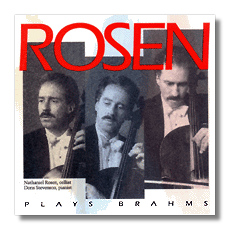
The Internet's Premier Classical Music Source
Related Links
-
Brahms Reviews
Mendelssohn Reviews
Schumann Reviews - Latest Reviews
- More Reviews
-
By Composer
-
Collections
DVD & Blu-ray
Books
Concert Reviews
Articles/Interviews
Software
Audio
Search Amazon
Recommended Links
Site News
 CD Review
CD Review
Cello Sonatas

- Johannes Brahms:
- Sonata for Cello & Piano #1 in E minor, Op. 38 (1865)
- Sonata for Cello & Piano #2 in F Major, Op. 99 (1886)
- Robert Schumann: Fantasiestücke for Cello & Piano Op. 73 (1849)
- Felix Mendelssohn: Song Without Words in D Major, Op. 109 (1845)
Nathaniel Rosen, cello
Doris Stevenson, piano
John Marks Records JMR5 1994 ADD 70:24
Within John Marks Records JMR5's generous duration of more than 70 minutes, 1978 Tchaikovsky gold medal winner Nathaniel Rosen does indeed play Brahms – and adds fifteen minutes of Schumann and Mendelssohn as well (nowadays it's necessary to add that the Mendelssohn and Schumann represented are Robert and Felix, not Clara and Fanny). American composer and writer Daniel Gregory Mason noted in his 1933 study of Brahms' chamber music that the composer took a very different approach to the cello in his two sonatas. The lower tessitura of the first risks exacerbating the uneasy balance of these two oddly-matched "running mates." The second was written with a more equal partnership in mind – and on the whole in a higher register. The first sonata's three movements all bear designations of at least allegretto. As, however, in other works by the master with even more contrasting markings, it can be difficult to tell the fast from the slow ones.
Nathaniel Rosen and Doris Stevenson benefit from a recording (1993, but originally analog – and with some tape hiss) that never muddies the combination of cello and piano, even when the cello is soldiering on in imitative counterpoint in its lowest register. It may be that such recordings do more than justice to composers' good intentions by masking the faulty judgment that had set the cello up to be swallowed by the piano in all but the most conducive acoustic environments.
Whatever the philosophical implications of such shrewdly engineered compatibility, however, Rosen and Stevenson's congenial collaboration reveal, under such ideal conditions, beauties that few audiences can apprehend fully in the concert hall. They display great stylistic sensitivity and a rich autumnal glow, whether in the lower registers of the first sonata (the first movement's lyrical opening is especially effective) or in the more complex interactions of the second sonata, notably in that sonata's sublime slow movement. Some of the viscosity of their approach to Brahms unfortunately carries over to Schumann's Fantasy Pieces, where the music could flow more directly and with a lighter and purer sweetness. Mendelssohn's song without words is an effective encore, and Rosen and Stevenson sing it sympathetically, with great beauty of tone.
This disc is complemented by well-written and perceptive notes by John Marks himself, notes that manage to explain the objectives of the works and describe their dramatic course without miring the reader in either overabundant detail or obscure terminology. The recording's commendable clarity, and Rosen and Stevenson's idiomatic performances, combine with the booklet's exemplary production values to make JMR 5 highly recommendable.
Copyright © 1998, Robert Maxham


















